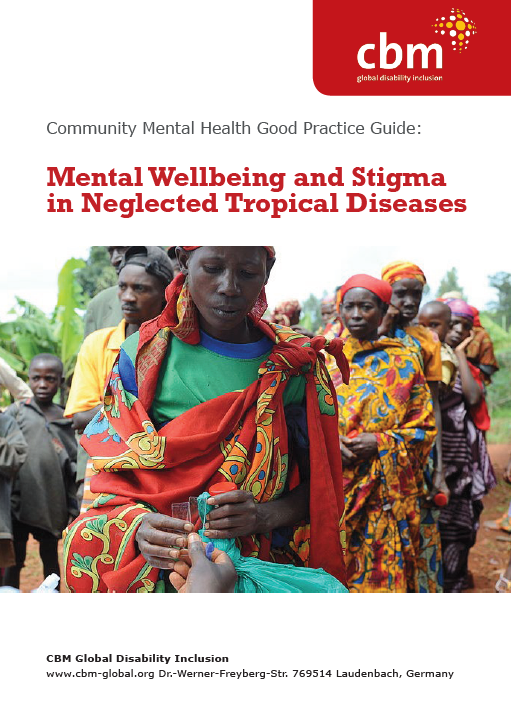
CBM wants to see a world where people with mental health conditions and/or psychosocial disabilities:
- Participate meaningfully and authentically in their communities
- Have a good quality of life and wellbeing
- Have access to dignified quality care and supports to address individual needs.
Mental Wellbeing and Stigma around Neglected Tropical Diseases
Neglected Tropical Diseases (NTDs) can be significant drivers of mental ill-health in the people they affect as well as their families and caregivers. This good practice guide draws on CBM’s experience supporting Community Mental Health in NTD care to highlight the link between mental wellbeing, stigma and NTDs, and document good practice examples of how mental health support for people with NTDs can be improved and community stigma reduced. It includes examples of how CBM is working with partners to mainstream mental health in NTD programmes; recommendations for scaling-up initiatives that support mental health and reduce stigma of people with NTDs; and links to other resources.
Peer Support
Peer support services for people with mental health issues promote connectedness, inspires hope, and offer a level of acceptance and understanding that is not found in other professional services. This good practice guide draws on CBM’s experiences supporting peer-to-peer programs in developing countries, featuring practical examples of the different ways that peer support can be delivered. This includes explaining what’s different between formal and informal peer support, self-help groups, and remote peer support. Includes links to other resources.
Mental Health System Strengthening
People with mental health problems and psychosocial disabilities often face barriers to exercising their rights and suffer a lot of shame, stigma and discrimination in accessing systems that should give people rights, including quality mental health care services. This good practice guide draws on CBM’s experience in mental health systems and service strengthening to demonstrate how mental health services can be improved. It includes examples of how CBM is strengthening mental health systems in West and Central Africa; how CBM is using the World Health Organisation’s (WHO) health system building blocks to improve mental health systems; recommendations for scaling-up mental health systems strengthening; and links to other resources.
Anti-Stigma and Awareness-Raising
Worldwide, people living with mental health conditions and/or psychosocial disabilities are experiencing stigma and discrimination. Drawing on the experience CBM and partners have gain by addressing stigma and discrimination in their work, this good practice guide documents and shares ideas, good practice and learnings about anti-stigma, anti-discrimination and awareness raising work. It looks at what is stigma and what are the challenges faced by people with disabilities; CBM’s anti-stigma and awareness-raising approach; and case studies evidencing the success of anti-stigma and anti-discrimination initiatives.
Community Mental Health Forums
Community Mental Health Forums (CMHFs) support community inclusion and participation, increase access to mental health services, and raise mental health awareness, reducing stigma and discrimination towards people living with mental health and/or psychosocial disabilities. This good practice guide draws on CBM’s experience with CMHFs to document and share ideas, good practice and lessons learned about CMHFs in low and middle income countries. It provides case studies evidencing the success of CMHFs, and explores the importance of involving traditional and faith healers in mental health care.
